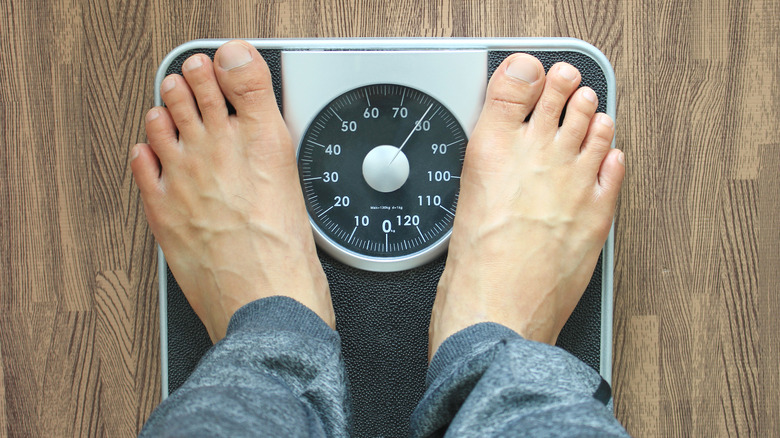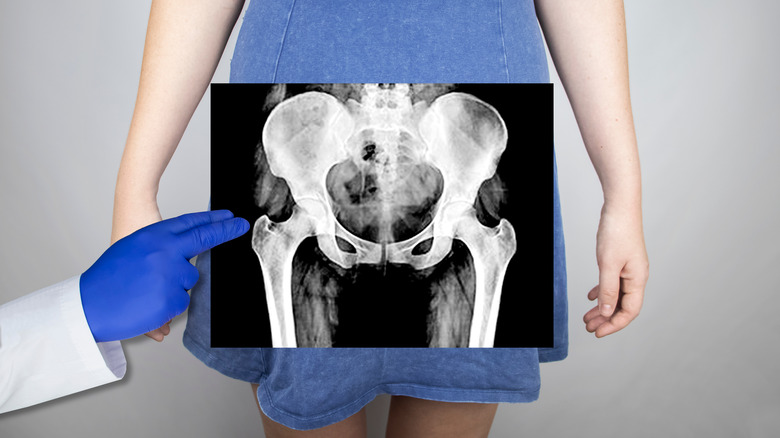What Happens to Your Body When You Stop Eating Gluten Then Eat It Again
When You Stop Eating Gluten, This Is What Happens To Your Body
According to the University of Nebraska–Lincoln, as many as 25% of Americans seek out gluten-free foods. For individuals with certain medical conditions, going gluten-free can significantly improve health. But if you don't have one of these conditions, giving up gluten probably won't do much.
Gluten is a protein found naturally in wheat, rye, and barley (via Johns Hopkins Medicine). For individuals with a wheat allergy, giving up wheat (the main source of gluten) is extremely important and can prevent symptoms such as hives, nausea, vomiting, nasal problems, and even life-threatening anaphylaxis (via the American College of Allergy, Asthma, and Immunology). For those with celiac disease, giving up gluten is also mandatory. Celiac disease is a serious autoimmune condition in which the immune system attacks the lining of the intestines when gluten is consumed. This can lead to problems absorbing nutrients and increased risk for a variety of conditions, including heart disease, cancer, and osteoporosis. As many as 2.5 million Americans may have undiagnosed celiac disease (via the Celiac Disease Foundation).
About 1% to 3% of Americans have non-celiac gluten sensitivity (NCGS), a condition in which they experience a variety of symptoms when eating gluten, but their immune system doesn't damage the intestines (via Harvard Medical School). Finally, some individuals have difficulty digesting fructans (sugars found in wheat and a few other foods), leading to a variety of gastrointestinal complaints. Although fructans and gluten are very different, going gluten-free can often improve symptoms because fructan intake is dramatically decreased (via Healthline).
You could de-bloat
Bloating is a common symptom for people with celiac disease, non-celiac gluten sensitivity (NCGS), or a sensitivity to fructans found alongside gluten in wheat. For these individuals, cutting out gluten could directly or indirectly help flatten their stomachs and ease intestinal gas and distension.
Among people with newly diagnosed celiac disease, bloating is one of the most common complaints. According to a 2003 study published in Digestive Diseases and Sciences, of the 1,032 celiacs surveyed, 73% experienced bloating and gas. In addition, a 2022 study of those with NCGS published in BMC Medicine found that 87% of respondents experienced bloating. In fact, bloating was the most commonly reported symptom, gastrointestinal or otherwise.
Fructans are a type of FODMAP (fermentable oligosaccharides, disaccharides, monosaccharides, and polyols). FODMAPs are carbohydrates that, while undigestible by humans, serve as food for your gut bacteria. When individuals who are sensitive to a particular FODMAP consume it, they can experience gas and bloating, among other GI symptoms. Identifying and avoiding the trigger FODMAPs can resolve these symptoms (via Healthline). While fructans can be found in a variety of foods, the main source is wheat. A paper published in the Journal of Nutrition found that 70% of fructans in the American diet come from wheat. So by going gluten-free, individuals are also inadvertently reducing their intake of fructans dramatically. In fact, a 2022 study published in Gastroenterology concluded that fructans, rather than gluten, may be the trigger for people who have been diagnosed with NCGS.
Your number twos may improve
Giving up gluten could make your trips to the bathroom much more pleasant. Chronic diarrhea is considered one of the hallmark symptoms of the "classical" (textbook) presentation of the condition. Individuals may also have pale, fatty, or particularly foul-smelling stool. These bathroom issues are the result of damage to the lining of the intestines, which means food can't be properly digested and absorbed as it makes its way through the GI tract (via the Celiac Disease Foundation). Frequent diarrhea is also a symptom of non-celiac gluten sensitivity (NCGS). In a 2022 study published in BMC Medicine of 486 individuals with NCGS, 54% complained of diarrhea, making it the third most reported gastrointestinal complaint. For these groups, cutting out gluten can normalize bowel movements.
On the other end of the spectrum, undiagnosed or unmanaged celiac disease may actually cause constipation because the damaged cells lining the intestinal wall absorb large amounts of liquid, causing stool to become hard and difficult to pass. For these people, cutting out gluten and allowing the intestinal lining to heal could lead to smoother sailing in the bathroom. On the other hand, cutting out gluten may inadvertently lead to reduced fiber intake, which in turn could actually cause, rather than improve, constipation (via Healthline). Regardless of why you're cutting out gluten, it's important to get enough fiber from other sources (such as legumes, vegetables, and gluten-free grains like quinoa) to keep your number twos number one.
Your weight could change
If you're cutting out gluten because you think it'll help you lose weight, it's time to rethink your weight-loss strategy. As the Cleveland Clinic explained, "There's absolutely no evidence that simply getting rid of gluten will result in weight loss." It may indirectly help you shed some pounds by encouraging you to choose healthier food options overall, but gluten isn't inherently fattening and there are plenty of calorically dense and unhealthy foods that are gluten-free.
If you've just been diagnosed with celiac disease and begin eating a gluten-free diet, you're more likely to see weight gain than weight loss. Because damage to the intestinal lining can cause malabsorption of nutrients and frequent bouts of diarrhea, many undiagnosed celiacs are malnourished and underweight (via the Mayo Clinic). Those with non-celiac gluten sensitivity (NCGS) may also be affected, even though their intestinal lining isn't damaged. A 2022 study of individuals with NCGS published in BMC Medicine found that 25% of respondents experienced weight loss. For those with celiac disease and NCGS, cutting out gluten can help them move the scale in a healthier direction.
It's important to note, however, that not all celiacs are underweight. The University of Chicago's Celiac Disease Center released a report that revealed that 22% to 32% of individuals with celiac disease are overweight or obese at time of diagnosis. Interestingly, although approximately 81% of celiacs gain weight on a gluten-free diet, 54% of overweight and 47% of obese celiacs lose weight once going gluten-free.
More pep in your step
There are a million things that can contribute to chronic fatigue, but gluten may be one that you haven't considered. Even though it's a very nonspecific symptom, tiredness is extremely common among individuals who can't tolerate gluten. In a 2022 study of more than 475 individuals with non-celiac gluten sensitivity (NCGS) published in MBC Medicine, 64% of respondents experienced tiredness when eating a gluten-containing diet, making it the second most common non-GI symptom. A 2003 study of 1,032 celiac patients published in Digestive Diseases and Sciences found that fatigue was the most commonly reported symptom, affecting 82% of participants.
Since feeling fatigued is so common in our hectic modern lives, how can you tell if yours is related to gluten or not? As Beyond Celiac explained, "While fatigue may be a natural and transient part of life, in a chronic condition such as celiac disease, these symptoms are unrelieved by adequate sleep or rest." The organization noted that while feelings of exhaustion can improve soon after individuals with celiac begin a gluten-free diet, this isn't always the case. Fatigue may be a secondary symptom of the malabsorption often seen in celiacs. Inability to properly absorb nutrients can lead to malnutrition and anemia, both of which can cause fatigue (via Verywell Health). These issues can be addressed with a gluten-free diet and proper supplementation but often take more time to resolve.
Your bones could become stronger
According to the organization Beyond Celiac, as many as 75% of individuals with newly diagnosed celiac disease have either osteoporosis or osteopenia. Osteoporosis is a "disease characterized by low bone mass and weakening of bone tissue that causes bones to become brittle and more likely to break." It can lead to back and hip pain, poor posture, and fractures. In osteopenia, bone mass is also lower than normal, but not yet severe enough to be considered osteoporosis.
Researchers believe that celiacs are at higher risk for low bone mass because of the malabsorption of nutrients and chronic inflammation characteristic of the condition. Specifically, trouble absorbing adequate amounts of calcium, vitamin D, and magnesium can negatively impact bone health. Although bone density usually improves on a strict gluten-free diet, Beyond Celiac noted that calcium and vitamin D supplements may still be needed to correct the problem.
The National Osteoporosis Foundation estimates that 10 million Americans have osteoporosis, while 44 million have osteopenia. The risk of low bone mass increases with age, but can affect people of any age. If you've been diagnosed with either osteopenia or osteoporosis — especially if you're under 50 — you should consider getting screened for celiac disease and going gluten-free.
You might be able to tolerate more dairy
In addition to improving calcium absorption, going gluten-free can indirectly benefit bone health for those with celiac disease by making it easier to consume more calcium-rich dairy products. As Beyond Celiac explained, many people with celiac disease develop lactose intolerance because the damage the immune system does to the intestinal lining makes it difficult for the cells there to produce the enzyme needed to digest the lactose in milk and other dairy products. Following a strict gluten-free diet gives the intestinal lining a chance to heal and begin producing the necessary enzyme.
It's important to note, however, that some degree of lactose intolerance is very common, even among people without celiac disease. According to a 2013 paper published in the European Review for Medical and Pharmacological Sciences, roughly 75% of the world's population will become lactose intolerant at some point in their lives. This means that their bodies will no longer be able to produce enough lactase, the enzyme needed to break down and digest lactose, the sugar found in dairy products. The undigested lactose can cause a range of unpleasant symptoms, including abdominal pain and cramping, gas, bloating, and diarrhea. Severity of symptoms can vary significantly from person to person, depending on how much lactase an individual can produce and how much lactose they consume.
If you have anemia, you could start seeing improvements
Iron-deficiency anemia occurs when you have too little iron to make adequate numbers of healthy red blood cells, which carry oxygen throughout your body. Anemia causes extreme fatigue and weakness and can lead to heart problems. It's common, affecting 20% of non-pregnant women, 50% of pregnant women, and 3% of men (via WebMD). While gluten has no direct impact on iron levels and doesn't cause anemia, the prevalence of this condition is especially high among people with celiac disease or non-celiac gluten sensitivity (NCGS). For these individuals, removing gluten from their diet could help get their anemia under control.
According to a 2022 paper published in BMC Medicine, approximately 23% of those with NCGS experience anemia. According to Beyond Celiac, anemia is particularly common among undiagnosed celiacs because the part of the small intestine where iron is absorbed is also the area damaged by the immune system when gluten is consumed. The connection between anemia and celiac is so strong that unexplained anemia is often the symptom that triggers an initial test for celiac. In a 2003 study of more than a thousand celiacs published in Digestive Diseases and Sciences, 63% had anemia. The good news, as Beyond Celiac explained, is that anemia usually substantially improves on a strict gluten-free diet, though it may take a few months to see results. Without gluten triggering the immune system to attack, the intestinal lining has a chance to heal, making iron absorption easier.
Your joints might ache less
In a 2022 study of individuals with non-celiac gluten sensitivity (NCGS) published in BMC Medicine, 31% reported frequent joint or muscle pain when consuming gluten. The connection may be even more significant for people with celiac disease. Beyond Celiac, citing a study conducted in Italy, noted that, "Celiac disease patients are four times more likely to have early signs of arthritis in the lower limbs than the general public." Nearly 50% of newly diagnosed celiacs have enthesitis (inflammation of connective tissues like ligaments and tendons), compared to only 27% of celiacs on a gluten-free diet. The Achilles tendon and kneecap were the areas most likely to be affected.
In an interview with the Arthritis Foundation, Dr. Rochelle Rosian noted that gluten is a pro-inflammatory protein and that people with non-celiac gluten sensitivity (NCGS) also have high rates of joint pain when eating gluten. Individuals with NCGS appear to be particularly susceptible to gluten-induced inflammation outside of the gastrointestinal tract, which most often shows up in the joints.
According to the Centers for Disease Control and Prevention (CDC) 24% of Americans have some form of arthritis. While we think of arthritis as affecting only the elderly, nearly 60% of people with arthritis are 18 to 64. Although osteoarthritis is the most common form of arthritis, there are dozens of others, including rheumatoid arthritis and lupus. The latter two are autoimmune conditions and, as Beyond Celiac explained, individuals with celiac are more likely to have other autoimmune conditions.
Skin improvements
Some individuals with celiac disease have a distinct skin condition known as dermatitis herpetiformis (DH). As Beyond Celiac explained, DH is sometimes known as celiac rash or gluten rash because only individuals with celiac disease get it. But not everyone with celiac will experience the condition, which is marked by extremely itchy and blistering skin. DH affects only about 15% to 25% of celiacs and is more common in men than women. It appears most often on the knees, elbows, and buttocks. Since only 20% of individuals with DH have the telltale GI symptoms usually associated with celiac, this skin rash is sometimes the first clue that there's a problem. Although sticking to a strict gluten-free diet will eventually resolve the rash, it may take up to two years and the affected area may have permanent pigmentation changes.
Beyond Celiac also noted that many people with celiac disease or non-celiac gluten sensitivity (NCGS) have reported improvements in acne after going gluten-free. Researchers haven't been able to find a clear link between gluten and acne, however, and it's possible that clearer skin is the result of other dietary changes that coincided with giving up gluten.
Although DH is unique to celiac, people with NCGS may also experience skin issues when they eat gluten. According to a 2022 study published in BMC Medicine, 29% of participants had a skin rash and 18% had dermatitis (an umbrella term for skin irritation).
You could improve your chances of conceiving
Although it's a topic that's often shrouded in secrecy and shame, infertility is quite common. According to the National Institutes of Health (NIH), infertility — defined as the inability to conceive after one year of trying — affects approximately 11% of women and 9% of men in the United States. While there are many causes of infertility, if you have celiac disease, consuming gluten may be negatively impacting your reproductive health, and going gluten-free could be the key to greater fertility.
Beyond Celiac noted that some research has indicated a link between undiagnosed celiac disease and fertility issues in both women and men, while other studies haven't found a connection. In one study, researchers found that, "In the two years prior to celiac disease diagnosis, women also become pregnant less often, with 25 fewer pregnancies per 1,000." Not being on a gluten-free diet when you have celiac has also been linked to increased risk for miscarriage, stillbirth, and preterm delivery. It's unclear, however, if fertility problems in celiacs stem from issues with the immune system or from nutritional deficiencies due to malabsorption. According to Beyond Celiac, people with non-celiac gluten sensitivity (NCGS) are also likely to be at increased risk for fertility issues. The organization suggests that anyone with unexplained infertility be screened for celiac or gluten intolerance.
Fewer headaches and migraines
Everyone has a headache from time to time, and even migraines are relatively common, affecting 35 million Americans (via the Migraine Institute). But eating gluten can trigger a headache or migraine in those with an intolerance, so going gluten-free could reduce the frequency of these painful attacks.
A study of individuals with non-celiac gluten sensitivity (NCGS) published in BMC Medicine in 2022 found that 54% of participants had frequent headaches when eating a gluten-containing diet. According to Beyond Celiac, many people with celiac disease report migraines after consuming gluten. In addition, "Some people with celiac disease find relief from migraines — such as how often they suffer from migraine attacks, the severity of the pain or how long they last — after beginning a strict gluten-free diet." The organization notes that although some research has indicated that migraine sufferers are more likely to have celiac, the connection is controversial and not universally accepted.
A paper published in Current Pain and Headache Reports in 2012 hypothesized that those with celiac disease and NCGS are more likely to experience headaches and migraines because their nervous systems are hypervigilant. Because the body is constantly being "triggered" when gluten is consumed, the nervous system can become overreactive, making migraine attacks more likely.
Your mental health could be affected
For sensitive individuals, eating gluten can negatively affect psychological well-being just as much as it can impact physical health. But going gluten-free doesn't automatically mean there'll be a positive shift in your mental health. According to Beyond Celiac, it's unclear if anxiety that emerges before someone is diagnosed with celiac is related to gluten consumption or not, but many celiacs report reduced symptoms once they begin a gluten-free diet. While having a diagnosis and a clear path forward is often a relief, worrying about accidentally consuming gluten or cross-contaminated foods can create post-diagnosis anxiety for some celiac patients.
According to Beyond Celiac, people with celiac disease are also 1.8 times more likely to experience depression. There are several theories for why this may occur. First, malabsorption of nutrients because of a damaged intestinal lining may impair brain function. The damaged intestines may also allow more substances to pass directly into the bloodstream, and some of these may negatively affect the brain. Even after diagnosis, individuals may become depressed because sticking to a strict gluten-free diet can require enormous dietary changes that can leave individuals feeling frustrated and deprived. Avoiding gluten can also create friction in social situations, such as eating out with friends, and may cause someone to feel lonely, misunderstood, or unsupported.
Among those with non-celiac gluten sensitivity (NCGS), a 2022 study published in BMC Medicine found that approximately 39% had anxiety, while 18% experience depression.
A boost in brain power
According to a 2022 article in Patient, "Brain fog is a general term for a set of symptoms affecting the cognitive processes. It isn't a medical condition in itself, but rather occurs as [a] common feature of other conditions." Brain fog can lead to issues with memory, information processing, concentration, higher-level thought, and speaking to or understanding others. Although there are many things that could cause brain fog, if you can't explain why your mind always feels muddled, it may be a sign of gluten intolerance, and going gluten-free could improve your mental clarity.
In a 2022 study published in Alimentary Pharmacology & Therapeutics, researchers administered a number of cognitive tests to celiac patients at regular intervals for a year following diagnosis. Individuals were tested on how well they could process information, their spatial abilities, memory, motor function, and attention. The study authors concluded that below-optimal cognitive performance in undiagnosed celiacs probably interferes with everyday tasks. They also found that, "In newly diagnosed celiac disease, cognitive performance improves with adherence to the gluten-free diet in parallel to mucosal [intestinal] healing." A 2022 study of individuals with non-celiac gluten sensitivity (NCGS) found that 38% of individuals experienced "foggy mind."
But for most people, going gluten-free will have no effect and might even be a bad idea
While it's true that people with celiac disease, non-celiac gluten sensitivity (NCGS), or a wheat allergy should remove gluten from their diet and can expect to see numerous positive changes in their health from doing so, going gluten-free is most likely pointless — and perhaps even dangerous — for the rest of us.
In an interview with WebMD, Dr. Andrew Chan explained: "For the vast majority of people who can tolerate it, restricting gluten to improve your overall health is likely not to be a beneficial strategy." In fact, Chan's research, which followed more than 110,000 individuals for a quarter century, indicated that those who consumed the lowest levels of gluten actually had a 15% higher risk for developing heart disease than those who ate the most. Although wheat isn't the only heart-healthy whole grain, Chan believes those who eat the least gluten also eat the least whole grains, accounting for the difference in risk.
According to Intermountain Healthcare, even if you believe you have celiac disease or NCGS, it's important not to go gluten-free before speaking with a doctor. Taking it upon yourself to avoid gluten (and giving your body a chance to begin healing) will actually make it more difficult to get an accurate diagnosis. Gluten-free products also tend to be more expensive than their gluten-filled counterparts, so why spend the extra money if you don't need to?
Source: https://www.healthdigest.com/821194/when-you-stop-eating-gluten-this-is-what-happens-to-your-body/















0 Response to "What Happens to Your Body When You Stop Eating Gluten Then Eat It Again"
Post a Comment